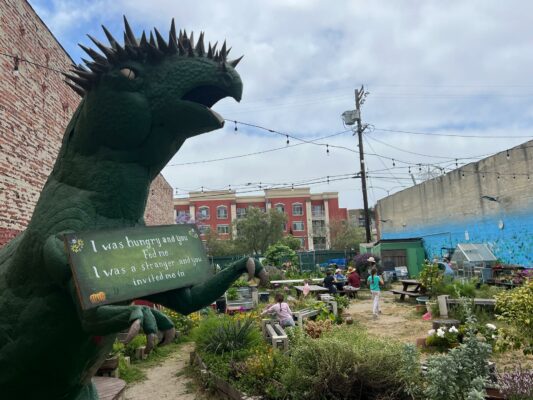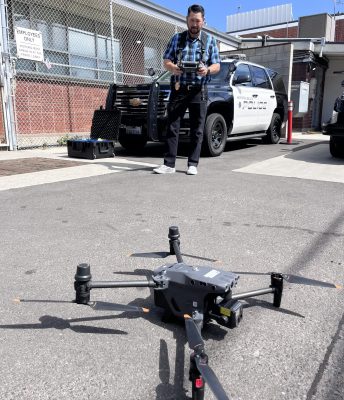The Manhattan Beach City Council Tuesday night unanimously approved an emergency loan program to help small businesses struggling to stay afloat through the pandemic.
The program will allocate $250,000, drawn from the city’s general fund reserves, which will be disbursed in $10,000 loans to businesses that employ 50 people or fewer. Highest priority will be given to independently owned businesses that have been closed due to COVID-19, and then to independent businesses that have been restricted due to the pandemic.
Councilperson Steve Napolitano said the city had to take action because the federal government has failed to do so.
“This isn’t just some well-intentioned program to make us feel good and get our names out there,” Napolitano said. “This is about supporting the businesses that we know and love and want to stay in business. We’re stepping in the shoes of what others should be doing and they’re not. The federal government should have another stimulus package that’s been held up. If there is another one, great. In the meantime we’ve got people suffering, and everyone says, ‘Oh, I wish such and such was still here, I wish so and so was still there.’ They’re going to say that after the fact, when we could have stepped up and done something.”
Councilperson Hildy Stern echoed Napolitano’s comments, noting that the failure of the federal government to provide more help to small businesses and employees forced to shut down required the city step in.
“It wasn’t done, so we recognize the necessity of this,” she said. “If we can see that there are businesses that need $10,000 just to try to hold on, that is so significant, then…We can do that.”
The loans may only be used for payroll, lease or mortgage payments, and utilities and accounts payable. Recipients must use loan funds to benefit businesses physically located in Manhattan Beach.
“The justification for it is who generated this money in the first place?” said Councilperson Joe Franklin. “Eleven percent of our revenue comes from sales taxes and business fees from these very businesses that we’re trying to help. So, by all means we need to help.”
The loans will be available on a first come, first serve basis. Businesses must have business licenses issued prior to the start of the pandemic and may not be in a residentially zoned area.
The businesses may not have any outstanding code violations, tax liens or delinquencies, and the loans must be secured through personal guarantees, promissory notes, or property collateral from the owners. Franchise businesses will also be considered but at a lower priority than independently owned businesses.
The interest rates will be tied to the state’s Local Agency Investment Fund (LAIF) plus .5 percent. LAIF’s most recent, three month average is .63 but is subject to variability, so the interest rate will likely end up between 1.2 percent and 1.6 percent, with repayment to begin 100 days after the local state of emergency is lifted and full repayment completed within three years. The final approving authority for each loan will either be the City Manager or a City Council subcommittee.
A few residents spoke in objection to the loan program. Alex Kirschenbaum argued that local government should not play the role of a banker.
“How do you plan to protect the city from liability when you give a loan to one business and [another business] that you turned another down sues you?” he said. “If this lending opportunity is so good, why aren’t local banks making these loans? If it isn’t a good risk for them, why is it a good risk for the city? When did the citizens of Manhattan Beach vote to use your city reserves for a small business loan program? While I recognize everyone involved has their hearts in the right place, do you not see the conflicts of interest you are according by having two city council members approve loans to local businesses? All city councilmembers ran saying they would be fiscally prudent. Why is this now changing?”
Mike Simms, a local restaurateur and president of the Manhattan Beach Downtown Business and Professionals Association, said the program should be seen less as a loan program and more as an investment. He calculated that $220,000 out of every $1 million in Manhattan Beach sales goes to taxes.
“I have no skin in this game because it is limited to businesses under 50 employees and all my businesses have more than 50 employees,” Simms said. “But if there’s one business that we can save — hopefully, many more — this is a lifeline to them. An empty storefront is a detriment to our community. There’re many on Manhattan Avenue right now; I talk to the vendors who are next to each one of them, and they’re concerned whether they’re going to stay in business, because it’s just some dead blocks.”
Napolitano acknowledged some risk in issuing loans but said the loan program’s potential benefit far outweighed its cost.
“It’s not without risk, we understand that,” he said. “But in the scheme of things, it’s not a lot of money for us, as opposed to what it will mean to them, to keep their doors open…. Yeah, we are not a bank. But FEMA for a pandemic is not coming, so something needs to be done to help these folks, and we are trying to do all we can.”
Councilperson Richard Montgomery emphasized that the city was responding to an emergency.
“I want to remind everybody, we’re in a pandemic, folks,” he said. “That’s not an earthquake, not a flood or a tornado. It’s a pandemic; we have no end date in sight….We are talking about helping out businesses. I don’t think the city is going to lose our AAA rating because we have one or two people that maybe — maybe — cannot pay back the loan. I trust the people we have been working with and have been here, to give them a chance and say ‘We support you’ and not just lip service.”
Help is coming from the private sector as well. Skechers president Michael Greenberg last week launched the Skechers Restaurant COVID Relief Fund, which is offering up to $500,000 in matching donations for every dollar contributed to help restaurants located in either downtown or North Manhattan Beach.
Though the city’s loan program has no such geographical restrictions and is not limited to restaurants, Franklin suggested the city look into possibly securing matching funds from Skechers for a portion of the loan program.
“That would be a multiplier,” he said. “So maybe that is something we can explore.”
Mayor Suzanne Hadley expressed reluctant support for the loan program. She said it was a symbolic gesture of support for local businesses but expressed concerns that the city was getting itself “in the lending business” and in the position of collecting debt from businesses.
“It’s not going to be easy for anybody in this city to have to collect so I don’t want anyone under the illusion that it’s going to be a lot of happy talk in six months or a year, when some of these loans don’t make it, that’s really going to be difficult,” Hadley said. “So I’m only on board because this is a pandemic…Time is of the essence.” ER









